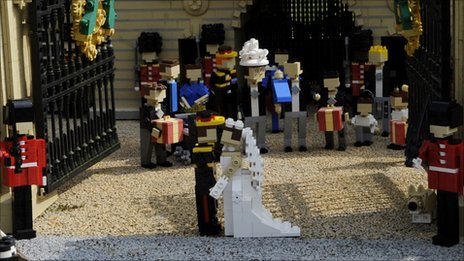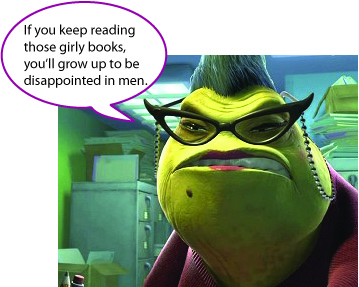
The Huffington Post had an article this week on Ten Tremendous Women Who Never Married. It’s an august list, you guys: Queen Elizabeth I, Susan B. Anthony, Florence Nightingale, and our own Miss Austen. Oh, and Oprah Winfrey. Samara O’Shea meant it as a “sweet reminder that you don’t need anyone but yourself to live an incredible life and have people remember you long after you’re gone.” True indeed, Samara, though you do need incredible drive and determination. Or, if you’re a cynical loner, these things happen more naturally.
Because Jane didn’t have all that hopeful a picture of marriage, did she? We may love to imagine Lizzie and Darcy, Emma and Mr. Knightley, et al., drifting off into the sunset, but Jane paints a dreadfully real picture of long-term marriage. Loveless marriage, that was her great fear, and what her heroines strive so much to avoid. Lots of heroines strive for love and marriage, but Jane knew so well what could go wrong, and she doesn’t let us forget it.
She lived with her parents all her adult life, and it shows. Just think of Mr. and Mrs. Bennet: “[he], captivated by youth and beauty, and that appearance of good humor which youth and beauty generally give, had married a woman whose weak understanding and illiberal mind had very early in their marriage put an end to all affection for her.” The dangers of loveless marriage are all around you in Pride and Prejudice, and Jane devotes a whole page to describing the ill effects of the senior Bennets’ marriage, not only on their own happiness, but on their children’s fates in life. (It’s at the beginning of Chapter 42, if you want to check it out.) Mr. and Mrs. Collins show us the beginnings of one of these loveless marriages, with Charlotte deriving all her happiness from “her parish and her poultry,” and so do Lydia and Wickham, “brought together because their passions were stronger than their virtue.” (What a delicate way to put it!) Today we are all too aware of the fragility of happiness in marriage, and while it was no doubt well-known in that time too, the idea that “respect, esteem, and confidence” was necessary in marriage was not so common. You might call it Jane Austen’s revolutionary thesis.
Most of the marriages in Austen’s books have a kind of nothingness to them, with the same history as the Bennets’. Think of Sir Thomas and Lady Bertram, Mary and Charles Musgrove, or Mr. and Mrs. Palmer in Sense and Sensibility (so hilariously brought to life by Hugh Laurie and Imelda Staunton). Or Mr. and Mrs. Allen, Catherine’s chaperones in Northanger Abbey. I’m always haunted by the line “Mrs. Allen was one of that numerous class of females, whose society can raise no other emotion than surprise at there being any men in the world who could like them well enough to marry them.” The idea being that they don’t like them for long; what usually passes for love doesn’t last. In a way it’s the lack of tragedy in these marriages that is heartbreaking. These people are just getting on with it, tied to someone they don’t love and don’t hate—just someone who annoys them day in and day out.
The only truly disastrous marriages I can think of are anything involving Lady Susan and that of Maria Bertram and Mr. Rushworth. And since Maria gets married out of spite and a broken heart, not too shocking that it doesn’t go well. She’s as emotional as Marianne, and she doesn’t get off so lightly.
On the happy side, we basically get the dark example of Fanny and John Dashwood in Sense and Sensibility, the Gardiners in Pride and Prejudice, and Admiral and Mrs. Croft in Persuasion: “If I loved a man, as she loves the Admiral, I would always be with him, nothing should ever separate us, and I would rather be overturned by him than driven safely by anyone else.” As she got older, was Jane mellowing? Surely Persuasion is a more mellow book in general, with musings on autumn, and the sea. I think she believed happy marriages were possible, but that they required a lot more thought and effort than people generally suppose. And that’s why Elizabeth Bennet, Emma Woodhouse, and Anne Elliot don’t just feel love (twue wuv!)—they think about it, as rational creatures. They think about love without being dreary and grim, and so they appeal to us today, when thought is more expected, if not universally practiced.
On being asked about her broken engagement, Jane Austen wrote to her niece, “Anything is to be preferred or endured rather than marrying without Affection.” Even living with your parents, it seems.
Photo credit: ©2009 Heather Dever. All rights reserved.




